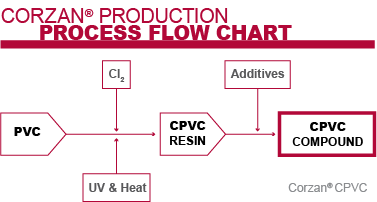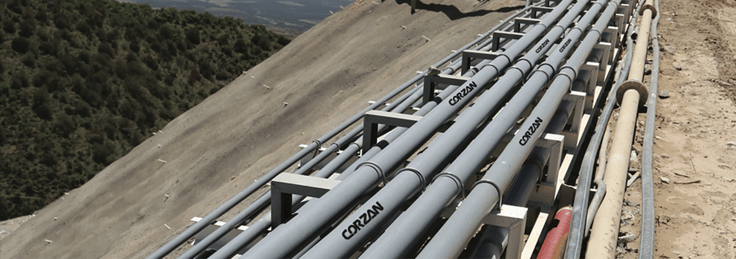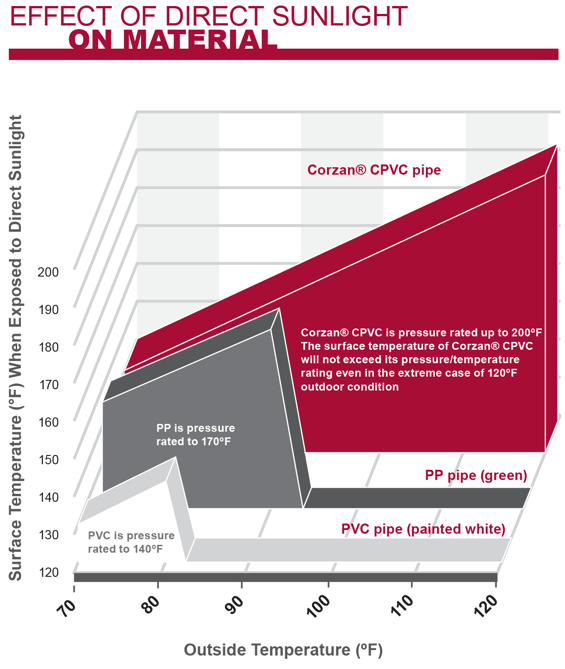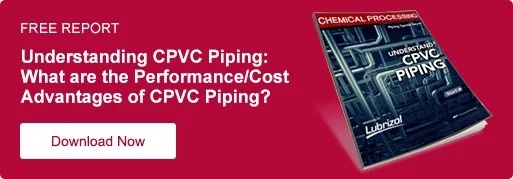What You Need to Know About CPVC and UV Weatherability
For many applications, industrial piping systems are installed completely or partially outdoors, exposing them to the elements. These can include seasonal temperature changes, wind, rain, snow, salt water and direct sunlight.
While thermoplastics ideally weather many of these conditions, some thermoplastics don’t stand up well to direct sunlight, or more specifically, ultraviolet (UV) radiation.
After prolonged UV exposure, some thermoplastics begin to chemically breakdown, which can lead to early degradation and shorten the system’s life expectancy. And, because Corzan® CPVC is also a thermoplastic, there are often incorrect assumptions about its UV weatherability.
In reality, Corzan CPVC is expertly engineered to stand up to the effects of prolonged UV exposure. Let’s take a look at how UV radiation affects thermoplastics and some CPVC piping systems.
How UV Exposure Can Affect General CPVC
CPVC is a PVC homopolymer that has been subjected to a chlorination reaction. During this chlorination reaction, UV light may be used as a catalyst to encourage chlorine ions to replace hydrogen on the PVC molecular backbone.

However, like any catalyst in a reaction, at some point it can start to reverse the process. Essentially, the same energy used to build up a material, can also be used to break it down.
With thermoplastics, too much exposure to UV light can weaken a material’s inherent properties, limiting key performance characteristics.
How Corzan® CPVC Resists UV Weathering
UV weathering is not an insurmountable issue when you thoroughly understand a compound and the effects UV light can have.
At Corzan Industrial Systems, the collective compounding expertise of our engineers has enabled us to integrate highly effective defense mechanisms that protect the material’s structural integrity against UV exposure.
Specifically, Corzan CPVC uses heavy amounts of carbon black and titanium dioxide (TiO2). Both additives are widely recognized as excellent ultraviolet blocking agents and effectively protect the polymer backbone from the effects UV light.

What About UV Discoloration?
With schedule 80 Corzan CPVC, you may see some discoloration on the piping exterior over time. It’s common to perceive this discoloration as an indication UV is damaging the pipe in some way.
Discoloration is actually part of the material’s natural weathering process and is not detrimental to the pipe. In fact, only a very small amount—a fraction of a millimeter—of the pipe’s surface experiences discoloration. A cross section of a pipe would reveal only the very top layer is discolored.
The titanium dioxide and carbon black protect the integrity of the pipe, keeping the pipe’s pressure rating, impact resistance and other physical qualities intact.
Is Paint Necessary for CPVC UV Weatherability?
Corzan CPVC piping does not require protective paint; however, other types of CPVC might. We recommend consulting with your manufacturer to determine what’s right for your application.
If paint is recommended or necessary (e.g. for indicating cooling water lines) use only acrylic latex paint with Corzan CPVC. Due to compatibility concerns, oil-based paint or two-part epoxy paint should never be used. To ensure compatibility with Corzan CPVC, consult the FBC System Compatible Program.
What About Radiant Solar Heat?
In addition to ultraviolet radiation, piping material must stand up to extreme radiant heat. In certain environments, radiant heat combined with ambient temperature can push a material past its heat distortion temperature. This is often a big concern with thermoplastics.
However, Corzan CPVC is engineered to maintain its physical properties well beyond what it may be exposed to in an outdoor environment. For example, Corzan CPVC is pressure rated up to 200°F (93.3°C).

Since outdoor installations are often unavoidable, our expertise enables the Corzan CPVC compound to withstand the environmental conditions of most regions around the world.
If compatibility or UV weatherability is a concern for your next piping installation, our team of product and engineering specialists are available for a free consultation.

